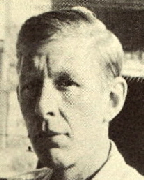Wystan Hugh Auden quotations from Forewords and Afterwords 
A god who is both self-sufficient and content to remain so could not interest us enough to raise the question of his existence.
—The Greeks and Us
The truly tragic kind of suffering is the kind produced and defiantly insisted upon by the hero himself so that, instead of making him better, it makes him worse and when he dies he is not reconciled to the law but defiant, that is, damned. Lear is not a tragic hero, Othello is.
—The Greeks and Us
The idea of a sacrificial victim is not new; but that it should be the victim who chooses to be sacrificed, and the sacrificers who deny that any sacrifice has been made, is very new.
—Augustus to Augustine
The basic stimulus to the intelligence is doubt, a feeling that the meaning of an experience is not self-evident.
—The Protestant Mystics
Whatever the field under discussion, those who engage in debate must not only believe in each other's good faith, but also in their capacity to arrive at the truth.
—The Protestant Mystics
The mystics themselves do not seem to have believed their physical and mental sufferings to be a sign of grace, but it is unfortunate that it is precisely physical manifestations which appeal most to the religiosity of the mob. A woman might spend twenty years nursing lepers without having any notice taken of her, but let her once exhibit the stigmata or live for long periods on nothing but the Host and water, and in no time the crowd will be clamoring for her beatification.
—The Protestant Mystics
In the late Middle Ages there were, no doubt, many persons in monasteries and convents who had no business there and should have been out in the world earning an honest living, but today it may very well be that there are many persons trying to earn a living in the world and driven by failure into mental homes whose true home would be the cloister.
—The Protestant Mystics
He [Kierkegaard] suffers from one great literary defect, which is often found in lonely geniuses: he never knows when to stop. Lonely people are apt to fall in love with the sound of their own voice, as Narcissus fell in love with his reflection, not out of conceit but out of despair of finding another who will listen and respond.
—A Knight of Doleful Countenance
I said earlier that I do not believe an artist's life throws much light upon his works. I do believe, however, that, more often than most people realize, his works may throw light upon his life. An artist with certain imaginative ideas in his head may then involve himself in relationships which are congenial to them.
—The Greatest of the Monsters
A craftsman knows in advance what the finished result will be, while the artist knows only what it will be when he has finished it. But it is unbecoming in an artist to talk about inspiration; that is the reader's business.
—A Poet of the Actual
Machines have no political opinions, but they have profound political effects. They demand a strict regimentation of time, and, by abolishing the need for manual skill, have transformed the majority of the population from workers into laborers. There are, that is to say, fewer and fewer jobs which a man can find a pride and satisfaction in doing well, more and more which have no interest in themselves and can be valued only for the money they provide.
—A Russian Aesthete
In most poetic expressions of patriotism, it is impossible to distinguish what is one of the greatest human virtues from the worst human vice, collective egotism.
The virtue of patriotism has been extolled most loudly and publicly by nations that are in the process of conquering others, by the Roman, for example, in the first century B.C., the French in the 1790s, the English in the nineteenth century, and the Germans in the first half of the twentieth. To such people, love of one's country involves denying the right of others, of the Gauls, the Italians, the Indians, the Poles, to love theirs.
—C.P. Cavafy
Most people call something profound, not because it is near some important truth but because it is distant from ordinary life. Thus, darkness is profound to the eye, silence to the ear; what-is-not is the profundity of what-is.
—Un Homme d'Esprit
Young people, who are still uncertain of their identity, often try on a succession of masks in the hope of finding the one which suits them — the one, in fact, which is not a mask.
—One of the Family
Most people are even less original in their dreaming than in their waking life; their dreams are more monotonous than their thoughts and oddly enough, more literary.
—Walter de la Mare
In all technologically "advanced" countries, fashion has replaced tradition, so that involuntary membership in a society can no longer provide a feeling of community.
—Lame Shadows
It is, for example, axiomatic that we should all think of ourselves as being more sensitive than other people because, when we are insensitive in our dealings with others, we cannot be aware of it at the time: conscious insensitivity is a self-contradiction.
—Markings
In any modern city, a great deal of our energy has to be expended in not seeing, not hearing, not smelling. An inhabitant of New York who possessed the sensory acuteness of an African Bushman would very soon go mad.
The Justice of Dame Kind
One can only blaspheme if one believes.
—Concerning the Unpredictable
The curious delusion that some families are older than others.
—As It Seemed to Us